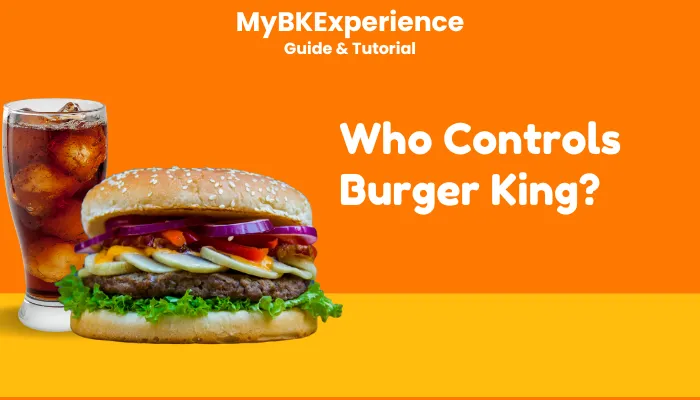Who controls Burger King? The answer isn’t as simple as one owner. Restaurant Brands International (RBI) holds primary ownership, but franchisees, investors, and executives shape its direction. Since its founding in 1954, the brand has evolved under multiple owners, adapting to market trends. From pricing strategies to international expansion, Burger King’s growth relies on its franchise model.
Even customer feedback platforms like MyBKExperience influence its future. Let’s explore the power structure behind one of the world’s most famous fast-food chains.

The Ownership of Burger King
RBI owns Burger King, with 3G Capital as a major stakeholder. Public investors and institutions also shape its future in the fast-food industry.
Who Owns Burger King Today?
The present ownership of Burger King rests with Restaurant Brands International (RBI). This Canadian company operates as a multinational fast food holding company.
- RBI was created in 2014 with the merger of Burger King Inc. and Tim Hortons.
- This company has also purchased Popeyes in 2017 and Firehouse Subs in 2021.
- It is publicly listed on New York Stock Exchange (NYSE: QSR) and Toronto Stock Exchange (TSX: QSR).
Major Shareholders of RBI
A combination of institutional investors and individuals are shareholders of Burger King.
| Shareholder | Percentage Owned |
|---|---|
| 3G Capital | Largest Stakeholder |
| Public Shareholders | Varies (NYSE, TSX) |
| Company Executives | Small Percentage |
| Other Institutional Investors | Multiple Stakeholders |
Role of 3G Capital in Controlling Burger King
A Brazilian-American investment firm, 3G capital, jumped into the spotlight when they purchased the fast-food chain Burger King back in 2010.
- 2010: 3G Capital purchased Burger King at the cost of $3.3 billion dollars.
- 2014: Merged Tim Hortons with Burger King, these acquired businesses formed RBI.
- Today: While 3G Capital no longer owns all of Burger King, it remains a major stakeholder.
3G Capital played a key role in Burger King’s transformation but now shares ownership with public investors. RBI continues expanding with brands like Popeyes and Firehouse Subs. The fast-food empire remains a strong force in the global market.
How Burger King is Managed and Operated?
Who controls Burger King? While RBI’s executives manage corporate decisions, franchise owners run most locations. With 93% of restaurants franchised, they handle hiring, marketing, and operations. RBI sets brand standards, but franchisees hold real operational power.
The Leadership Team
Burger King’s daily operations are managed by executives under the umbrella of Restaurant Brands International (RBI).
| Executive Position | Name |
|---|---|
| CEO of RBI | Joshua Kobza |
| President of Burger King | Tom Curtis |
| CFO of RBI | Matthew Dunnigan |
Franchise Model – The Real Power Behind Burger King
Unlike many corporations, Burger King operates primarily through franchising.
- 93% of Burger King restaurants are franchise-owned.
- Franchisees control hiring, marketing, and store management.
- The company sets brand guidelines but does not run all locations directly.
So, when asking who controls Burger King?, a big part of the answer lies with its franchise operators.
RBI oversees Burger King’s brand, but franchise owners control daily operations. With 93% of locations franchised, real decision-making power rests with individual operators.
The Evolution of Burger King’s Ownership
Who controls Burger King? Since 1954, ownership has transferred from the founders of the business to large corporations. Modernly, Restaurant Brands International controls the company and is responsible for its international branding.
The Different Owners Over the Years
Since it was founded in 1954, Burger King has had several owners.
- 1954-1967: Founded by James McLamore & David Edgerton.
- 1967-1989: Purchased by Pillsbury Company.
- 1989-1997: Acquired by Grand Metropolitan (later became Diageo).
- 1997-2002: Controlled by Diageo.
- 2002-2010: Acquired by a private equity group behind TPG Capital, Bain Capital, and Goldman Sachs.
- 2010-Present: Purchase by 3G Capital together with Burger King, and later incorporated into Restaurant Brands International (RBI).
This continuous change of ownership depicts the constant evolution of the fast-food sector.
Who controls Burger King? RBI oversees the brand, but past owners, from Pillsbury to 3G Capital, have shaped its legacy. This evolution reflects the fast-food industry’s ever-changing landscape.
Burger King’s Global Influence
Although Burger King is present in more than 100 countries, the question remains, who manages its expansion? It’s simple. Burger King’s growth is controlled by individual regional franchise agreements tailored towards specific markets and their strategies.
Who Controls Burger King’s International Expansion?
Over 100 countries have a business operated by Burger King, however, its growth is handled through regional franchise agreements.
- North America: Directly managed by RBI.
- Europe & Asia: Handled by master franchise partners.
- Latin America & Middle East: Controlled through development agreements.
Each region has different franchise models, pricing, and marketing strategies based on local preferences.
Financial Power and Market Position
Burger King’s revenue continues to grow, reaching an estimated $2.2 billion in 2023. While RBI oversees brand strategy, franchisees manage pricing and marketing to fit local markets.
How Much Revenue Does Burger King Generate?
Like any other brand under RBI, Burger King takes a slice from the pie under the company revenue.
| Year | Burger King Revenue (In billions) |
|---|---|
| 2021 | $1.81 Billion |
| 2022 | $1.96 Billion |
| 2023 | Expected $2.2 Billion |
Burger King’s revenue continues to grow, solidifying its position in the global fast-food market.
Burger King’s Pricing and Marketing Control
While RBI executives set brand guidelines, individual franchisees control pricing and local promotions.
- Menu items vary by country to cater to local tastes.
- Advertising is both global and regional.
- Seasonal promotions like the Whopper Melts are coordinated between corporate and franchisees.
This mix of corporate control and franchise independence is unique to Burger King.
Who controls Burger King? RBI oversees global operations, while franchise owners manage local pricing and promotions, ensuring competitiveness worldwide.
Burger King’s Future Strategy and Innovation
Who controls Burger King’s future strategy? RBI executives and franchise owners drive innovation, focusing on digital expansion, sustainability, and global growth.
Economical Future Plans and Innovations
To remain competitive in the fast food sector, Burger King is always changing.
Key Strategies:
- Increased Digital Services – Mobile ordering, new drive-thru systems, and loyal customer programs.
- Environmental Measures – Reducing emissions and providing sustainable containers for products.
- Redesigning Menu Items – Adding more plant-based foods, for instance, The Impossible Whopper.
- Franchise Growth – Expanding into new markets in Asia and Africa.
The ultimate decision-makers are RBI executives and franchise owners, but the company also listens to consumer preferences and market trends.
Conclusion
Who controls Burger King? It is more complicated than just one person having complete control. The company is owned by Restaurant Brands International (RBI), but the franchise managers, capitalist investors, 3G Capital, and corporate bosses also control much of the company. The future of Burger King depends on its leaders, franchisees, and competition strategy to still be a multinational fast-food company. So, whether you bite into a Whopper or participate in MyBKExperience, now you understand who is responsible for the brand.
